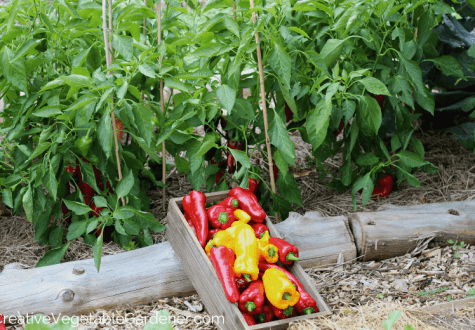Best Fertilizers for Peppers: Achieve Superior Results in Your Yard
Best Fertilizers for Peppers: Achieve Superior Results in Your Yard
Blog Article
Organic Vs. Synthetic Fertilizers: Which Is Best for Supporting Healthy Pepper Plants?
In the realm of supporting healthy pepper plants, the choice in between artificial and natural fertilizers stands as a critical decision with far-ranging effects. While both alternatives objective to provide important nutrients to sustain plant development, the nuances of their influence on the soil, plant health, and the environment trigger a dispute that echoes throughout the horticulture community. Understanding the distinctive advantages and potential risks of each fertilizer kind is vital for pepper cultivators seeking to enhance their yields while preserving an eco-conscious and lasting method.
Advantages of Organic Fertilizers
Organic plant foods use a sustainable and environmentally-friendly technique to nourishing pepper plants, supplying important nutrients without using synthetic chemicals. These all-natural plant foods are stemmed from natural resources such as compost, manure, bone dish, and seaweed, advertising soil health and wellness and biodiversity. Unlike artificial plant foods, natural choices release nutrients slowly, ensuring a constant and balanced supply for pepper plants to grow.
One considerable advantage of organic fertilizers is their capacity to improve dirt structure and water retention. By improving dirt health, organic plant foods advertise useful microbial task, which assists in nutrient uptake by pepper plants. Furthermore, natural fertilizers lower the threat of chemical run-off, protecting water sources from air pollution and protecting the setting.
In addition, organic fertilizers contribute to long-lasting soil fertility by promoting the development of beneficial soil organisms. These organisms assist damage down natural issue, launching nutrients in a type that is quickly obtainable to pepper plants. best fertilizers for peppers. By cultivating a healthy and balanced soil community, organic fertilizers support sustainable pepper growing practices that profit both plants and the setting
Downsides of Artificial Plant Foods
Artificial plant foods, unlike their natural equivalents, posture various negative aspects when used to nurture pepper plants, influencing both plant health and environmental sustainability. One significant drawback of artificial plant foods is their propensity to leach nutrients from the soil swiftly. This quick leaching can bring about nutrition discrepancies in the dirt, causing plants to experience poisonings or shortages. In addition, artificial fertilizers can harm advantageous soil microorganisms, such as earthworms and valuable microorganisms, interrupting the soil ecological community's equilibrium.
Additionally, the overuse of synthetic plant foods can contribute to water pollution. Excess plant foods not absorbed by plants can remove into water bodies, leading to eutrophication, where algae blossoms deplete oxygen degrees in the water, harming marine life. Moreover, synthetic fertilizers are generally originated from non-renewable resources, such as fossil gas, adding to carbon exhausts and environmental my company destruction during their manufacturing.
Nutrient Absorption Comparison
When comparing natural and artificial fertilizers in terms of nutrient absorption, organic plant foods have the benefit of providing a much more balanced and slow-release source of nutrients. Organic plant foods have a selection of macro and micronutrients that are not only advantageous for the plants however additionally promote healthy dirt microbial activity, which assists in nutrient uptake.
In addition, natural plant foods boost dirt framework and water retention capability, enabling pepper plants to gain access to nutrients a lot more successfully. This enhanced soil high quality helps with root development, allowing better nutrient absorption. Synthetic plant foods, although originally improving plant growth because of their high nutrient concentrations, might prevent lasting nutrient absorption by degrading soil health with time.
Ecological Influence Factors To Consider

On the various other hand, synthetic fertilizers, although often even more right away readily available and concentrated to plants, can have harmful effects on the atmosphere if not applied properly (best fertilizers for peppers). Their manufacturing requires high power inputs, leading to greenhouse gas discharges and contributing to environment change. The overflow of excess artificial plant foods can contaminate water sources, leading to eutrophication and damaging aquatic environments.
Best Fertilizer Practices for Peppers
When feeding pepper plants, optimizing nutrient uptake and lessening ecological impact are crucial considerations. To achieve this, it is crucial click to comply with finest plant food techniques customized to the specific needs of pepper plants. One essential method is to do a dirt examination prior to using any kind of plant foods. This examination can figure out the pH degree of the dirt and determine any type of nutrient shortages, assisting you in picking one of the most ideal fertilizer formula.
Another important practice is to feed pepper plants at the correct time. Usually, peppers benefit from receiving plant food at growing and afterwards once more when they begin to flower. Over-fertilizing can result in nutrient imbalances and damage the plants, so it is crucial to comply with suggested application rates.
In addition, choosing a well balanced fertilizer with an NPK proportion that suits pepper plants' needs is basic. Eventually, integrating natural and artificial plant foods judiciously can assist support healthy pepper plants while lessening environmental effect.
Verdict

Organic fertilizers use a sustainable and environmentally-friendly strategy to beneficial pepper plants, offering necessary nutrients without the use of synthetic chemicals. Unlike synthetic plant foods, natural options release nutrients gradually, making certain a stable and balanced supply for pepper plants to thrive.
Synthetic fertilizers, find out here in comparison to their natural equivalents, pose various drawbacks when made use of to nurture pepper plants, influencing both plant health and environmental sustainability. When comparing organic and artificial fertilizers in terms of nutrient absorption, organic plant foods have the benefit of giving a more balanced and slow-release source of nutrients.Additionally, organic fertilizers improve soil structure and water retention capability, enabling pepper plants to access nutrients a lot more efficiently.
Report this page